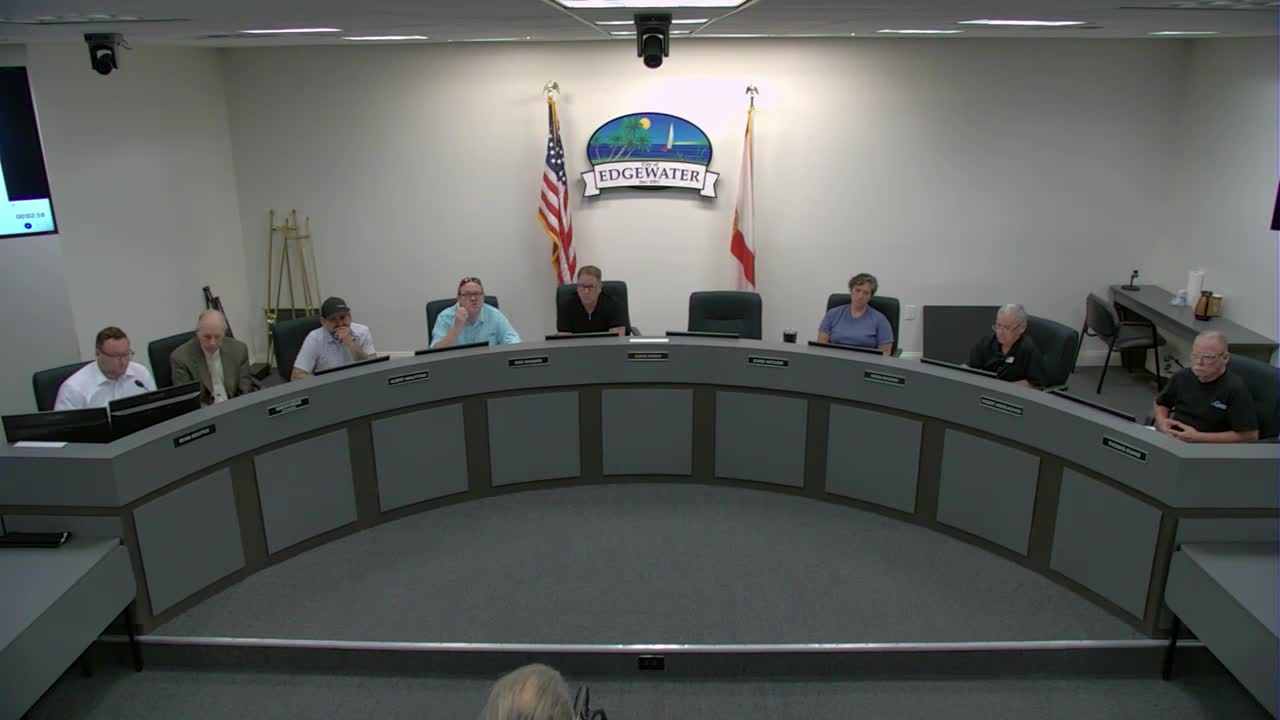Residents sound alarm over flooding risks from new development
August 14, 2024 | City of Edgewater, Volusia County, Florida
This article was created by AI summarizing key points discussed. AI makes mistakes, so for full details and context, please refer to the video of the full meeting. Please report any errors so we can fix them. Report an error »

Residents of Edgewater voiced strong concerns during a recent government meeting regarding a proposed development project that could exacerbate existing drainage issues in the area. The project, which involves the construction of a 20-acre property, has raised alarms among local homeowners who fear it will disrupt the natural flow of water and lead to increased flooding.
Several residents, including Harry Diffenbaugh and Cynthia Matters, highlighted that the proposed site is primarily classified as wasteland and that the development would require significant filling to meet city elevation requirements. They argued that this alteration would prevent the land from absorbing water, effectively creating a dam that would redirect stormwater onto neighboring properties. Matters emphasized that the current drainage system is already overwhelmed, often leading to overflow onto adjacent lands.
The discussion also touched on the implications of removing agricultural zoning, with residents expressing concerns that the increased concrete surfaces would further limit water absorption. Matters pointed out that the area lacks adequate drainage infrastructure, questioning the effectiveness of proposed stormwater retention ponds and drainage pipes.
City officials responded by assuring residents that the development would adhere to new stormwater standards, which require that post-development water flow must be less than pre-development levels. However, residents remained skeptical, citing past experiences where similar assurances did not prevent flooding.
Tammy Copeland, another local resident, shared her personal experience of worsening drainage conditions over the past three decades, noting that her property now frequently experiences standing water due to inadequate drainage solutions.
As the city moves forward with the approval process for the development, residents are left grappling with the potential consequences on their properties and the broader community's water management challenges. The meeting underscored the urgent need for comprehensive studies and transparent communication regarding the impact of new developments on local infrastructure.
Several residents, including Harry Diffenbaugh and Cynthia Matters, highlighted that the proposed site is primarily classified as wasteland and that the development would require significant filling to meet city elevation requirements. They argued that this alteration would prevent the land from absorbing water, effectively creating a dam that would redirect stormwater onto neighboring properties. Matters emphasized that the current drainage system is already overwhelmed, often leading to overflow onto adjacent lands.
The discussion also touched on the implications of removing agricultural zoning, with residents expressing concerns that the increased concrete surfaces would further limit water absorption. Matters pointed out that the area lacks adequate drainage infrastructure, questioning the effectiveness of proposed stormwater retention ponds and drainage pipes.
City officials responded by assuring residents that the development would adhere to new stormwater standards, which require that post-development water flow must be less than pre-development levels. However, residents remained skeptical, citing past experiences where similar assurances did not prevent flooding.
Tammy Copeland, another local resident, shared her personal experience of worsening drainage conditions over the past three decades, noting that her property now frequently experiences standing water due to inadequate drainage solutions.
As the city moves forward with the approval process for the development, residents are left grappling with the potential consequences on their properties and the broader community's water management challenges. The meeting underscored the urgent need for comprehensive studies and transparent communication regarding the impact of new developments on local infrastructure.
View full meeting
This article is based on a recent meeting—watch the full video and explore the complete transcript for deeper insights into the discussion.
View full meeting